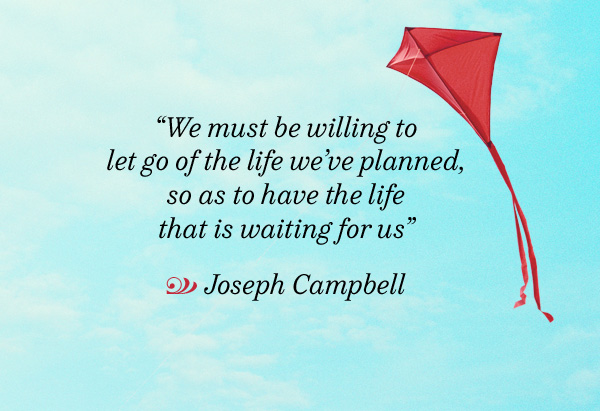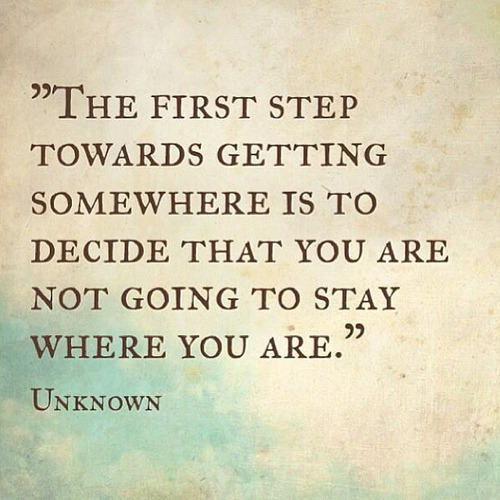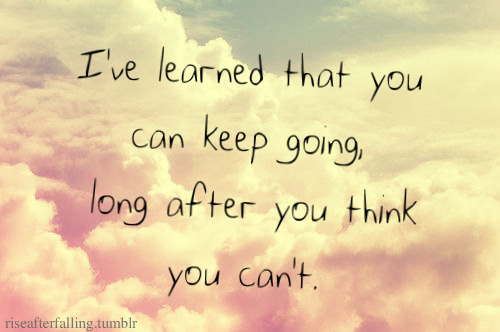 |
| Image: quotesgram |
Being chronically ill and disabled has made me incredibly aware of when others are not completely grateful for their freedom, independence and abilities. Obviously, I have become aware of these characteristics because of the adversity I have faced in my health. I feel like preaching how life can change in an instant, to be grateful for every little thing they are capable of at this moment in time, yet I know you never truly realise how lucky you are in the smallest of ways, until you are put in a situation that makes it obvious. On a more positive note, I also know that if I am ever lucky enough to regain and rebuild aspects of my independence, I will feel incredibly grateful for the smallest of things, because I've gone without it for such a long time. I know that it really is, a large and beneficial foundation in the ability to live your life.
It has been a harsh reality check that the older I have become with a chronic illness, the more dependant I have had to become on my closest companions. This isn't necessarily going to be forever, partly because I am optimistic, partly because I won't allow myself to be for my personal aspirations and goals. Those with a chronic illness or disability have an awful lot of pride, without the full bodily functioning tools in order to go through their illness alone when at it's peak. My mind can often feel as determined as a healthy being, which is a frustration. Currently, I wake up everyday and feel like I have to teach myself how to walk from the pain I experience. Every limb throbs, every joint aches and every organ feels like it has been chewed up and spat out. This can feel like a huge setback in the initial start to a new day.
We can feel like we are burdens to those we love and care about, when asking for help or support. It's good to try and remember as a daily mantra, that we are not our illness or disability, we just have one. We can't help the fact that our illnesses have had a drastic impact on our lives, we can only try to adapt currently and be optimistic for our futures. I am quite stubborn towards my illness, I like to think I can do things like any other young woman my age yet in reality, unfortunately I can't complete the task at hand more often than I can. I say to myself, 'For goodness sake Nancy that was easy', when really I should say, 'If you are that determined you can always try again tomorrow, Nancy'.
The necessity of accepting help from others has sometimes had the ability to make me feel defeated, which is something I need to overcome to improve my quality of life. On one hand I am always so grateful and appreciative for the help that someone may give me, yet I am also plagued with the guilt and frustration too. Do they think I am weak? Lazy? Unhelpful? I have tendencies of feeling angry at myself over my disabling illness. Usually over the fact that tasks that are so simple and not thought twice about to others my age, like brushing teeth, washing hair or lifting a drink can become less simple as they once may have been or should be on incredibly bad days. In my mind, I can imagine and see myself doing everything that I find really difficult in my reality. This is where physically, I falter and feel a lot of anguish over.
I have found it incredibly difficult to accept that my limits are now a little more obvious to myself, over bearing at times and unwanted in correlation to my age. I don't want to be a person who has to rely on family and friends, I want to be independent for my age, my sanity and within my lifestyle. I always say that I want and aim to be the best version of myself, however I know that I need to work on becoming the best version of myself as a chronically ill, disabled person rather than being hung up on the old me. I will get there, in time. Although I will say that everyday, I really try to push myself to do the things that many take for granted. Not only does this keep me sane, it helps me to not determinate any faster and keeps my mindset stronger than if I just gave up without a fight.
There was a recent occasion where I went to a restaurant with my Mum, I was having an incredibly weak day with body feeling incredibly painful and heavy. Other than a fork, the most beneficial tool to feed myself was not co operating. My arms, hands and fingers seemed to have a mind of their own with persistent hyper-extending and subluxing. It dawned on me after my first bite of food that I couldn't actually cut my food without intense, surging limb pain. I wanted to burst into tears when my Mum saw me struggling and offered to help me cut my food. I felt like an invalid and I was so angry that my condition had caused that to happen in public. I felt mortified inside and very aware of how disabling my illness had made me become. Nobody had been looking, they were too busy enjoying their own meals but inside, I felt so defeated. Something I rarely manage to do no longer felt do able and implemented another fear in to my life. Being my typical stubborn self, every time Mum offered to help from then on I said that I was OK and could do it myself. I couldn't, but I had to find a way to do it myself after my Mums initial help.
There are some days where your illness and disability shows a stark reality of how things have truly changed in your life. The difficulties you face on a day to day basis will probably always arise thoughts or question over why life is now this way, when it never used to be or when it typically shouldn't be. In the past I've felt in my heart it shouldn't be the case, but right now in the present, it is. I always say that is easier to accept today for what it is instead of convincing yourself that life will always be this way because of an illness. Which I have tendencies to do on a bad day. Every time I have the scary thoughts that life may always be this bad, I try with all of my might to challenge myself on that and say, 'you don't know what next week will be like yet, let alone forever'. This thought alone has become the hope I needed someone to give me on a bad day, an answer I searched for forever that ultimately, I found within myself.
I really struggled in the youth of my teens, knowing full well that it was beyond difficult to even get out of the bed, brush my hair and put my shoes on by myself, whilst my peers were at school running around at break time, deciding what to wear for prom and worrying together over exams. My illnesses have been the little devil on my shoulder for many years, unrealistically comparing myself to others. It is a thought that can make me feel sad, yet it's becoming a little less upsetting when I instead look towards people who are like me. There is nothing worse than a day where you feel incredible amounts of pain, isolated and lonely from your condition.
Those with a chronic illness or disability sometimes have to rely on others for the simple things. Such as sorting their medications, pouring their drinks, holding appliances, cooking their meals, putting on their shoes, holding bags and really simple things, that don't take much thought like getting the milk out the fridge. I can have symptoms where I feel so paralysed, I can barely communicate but know in myself I need to take a dose of medication. I want desperately to be able to do so myself in those moments but I usually need help. It can be incredibly frustrating and sometimes, you begin to wonder if things will be stuck this way. You need a lot of patience with yourself and your limits, yet you also have to become somewhat bulletproof in the emotions that come with asking for the help when you are feeling desperate for it. We tend to push ourselves to extreme lengths in order to complete simple tasks ourselves, so I know that personally, I don't ask for help very easily because I should be able to do all of these things as an independent adult. When I do manage to do complete a simple task alone, it's a celebration that I acknowledge inwardly. Every minute of everyday arises little challenges that we will either have to adapt or find the ability to get through. I think that's what outsiders forget, we are fighting a huge battle with ironically, every step we take.
The concept of being offered a helping hand in chronic illness is something I still battle with. I don't take to the process like a duck to water because I don't want it to be the case at the mere age of 21. The thought of receiving help made me feel incredibly petrified in the early days of being chronically ill. Surely my diagnosis couldn't cause that. I can't be 'cared' for as a young adult with Ehlers Danlos Syndrome, it's not right, it shouldn't even be the case, why is it the case? It was and still is the case and my advice would be to take the concept with a pinch of salt and try not to be judgemental as otherwise, your mind will just spiral into a low state. I misjudged the situation and took the thought of being helped with simple things as a negative thing. When in reality, any decent parent will 'care' for their child till the day they die, it's just their nature. They want to protect and help their children in anyway they can. I am incredibly grateful for all that my Mum and Dad continue to do for me at the moment, they help me with a lot that a 21 year old should be able to do with ease. They both work full time and help me in the spare time that should be their freedom. I know any loving parent would do this for their child and I hope to one day, be able to pay them back for all they have done and put on hold for me.
I have so much respect for anyone in this life who is or has been a carer. It's not an easy job to take on. We need to remember that carers can also feel cut off from their personal lives. They may become unsure of how to balance their happiness as an individual with the care needs of someone else. There can be a lot of guilt for both parties. Guilt on behalf of the ill person feeling like the have to rely on certain people for a lot of help and guilt for the carers, not knowing how to fully help in every situation whilst sacrificing their own lives too. Although my family are not registered paid careers because of the funding policy, they constantly care for me, day and night in anyway the can. I never envisioned my family having to care for me at such a young age and feel terribly guilty a lot of the time whilst it is our reality.
I am trying to not put a benchmark on my limitations, if I can't do something today I might be able to complete it tomorrow or next week. This also works the other way, when I get frustrated at what I used to be able to do, it always has the possibility of coming back to me in the future and I can try again. Even silly day to day things such as, being the person to open my dogs dinner and give it to him. Some days I can and some days I can't. On the day I can it is fantastic and on the days I can't, it's a setback but I can try again tomorrow. I often have to remind myself that in some circumstances, I am not able enough and to try an accept it for now. Sometimes, I push through because I have the want, will and physical ability that hour to do so. Other times, my physical ability and pain threshold is the dictator over what I personally want to achieve. Sometimes, I will stand and want to walk freely and realise that actually today, I need my aids to help me around the house. In the same day, I may also try to coach myself through the moment and convince myself that I can walk a few steps inside without an aid. Pain and symptoms can change unpredictably, hour to hour.
There are many days where my body feels against me and this is when I acknowledge the reality of my current position in life, but it might not always be this painful or disabling. There are days where I tell myself to push through and do something, in order to feel like an adult who is as capable as she feels in her mind. Typically with the mentality of being someone without the limits that pain can present to me on a daily basis. I always think I would personally like to be treated as normal as possible, so whatever everyone else enjoys doing our age, I think people should try to help us be a part of it too. It's horrible feeling left out and isolated, it's a feeling that is far too common in illness. It's good to feel you have an outlet or community of support, such as the spoonie community. I don't want to fully accept I am disabled as I feel that mindset will personally make me too hung up on my circumstances. I want to feel empowered by the term disability and acknowledge the word in a positive way, not as someone who feels helpless in their circumstances. I have the faith that one day, I can say I got to that place too.










